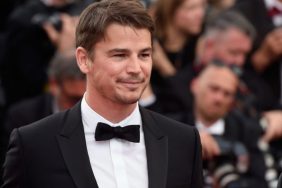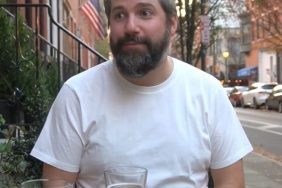Dave McKean is worried about us. We live in a world where our fantasies are commoditized and shoved down our throats and maybe have less to say about the world we live in and experiences we share than they are supposed to. That’s one of the reasons he made Luna, a new film playing at this week’s Toronto International Film Festival about the way imaginations affect and infect two couples dealing with the loss of a child both directly, and by proxy.
Our full review of Luna is coming soon, but first, let’s have a talk with award-winning artist Dave McKean about the feature that took seven years to complete, the importance of fantasy, the way he recycles his ideas and his intention to use Kickstarter to partially fund his next film project.
Related: TIFF 2014 Review: ‘Luna’ Shines a Light on Grief
CraveOnline: This film was not what I expected…
Dave McKean: Okay.
And I mean that in a good way.
Good!
I don’t mean I expected it to be bad, but then it got good.
Well, I’m glad.
Well, I’m a fan of your art and I love Mirrormask…
No, it’s not Mirrormask.
No, it’s not. But the description made it sound like it was going to be a “Through the Looking Glass” kind of film, but it’s much more grounded than that. Was that the intention? Did you want to stay in the real world more with your next film?
Well to be honest that’s the kind of work that I love. I love fantasy, imaginative imagery and everything, but I only really love it when it’s grounded in reality, and that’s its purpose as far as I’m concerned. Whereas Mirrormask, for all the fact that it looks so much like my painting and everything, it felt very much like Neil [Gaiman]’s take on fantasy. Neil loves to look at old myths and fairy tales and reimagine them and reshape them and old story tropes like Alice in Wonderland or The Wizard of Oz, whereas I try to find new story shapes. It’s why I don’t really write so much. But I like to try and find different story shapes, and the fantasy only really works for me if it shines a light on or magnifies or allows you to see something very real, in the real world, in a different way, and you get to understand it in a slightly different way.
There’s an argument in the film that Grant and Dean have about fantasy’s place…
That’s my manifesto.
Is that a conversation you’ve specifically had with someone?
It is, yes. I have it on both sides. I have lots of friends who don’t like fantasy at all and they like realistic drama and they don’t like any of that silly fantastical stuff, and I try and explain [about] writers like Kafka and people like who use fantastical fiction but to deal with the very real world. And I obviously have friends on the other side who paint dragons and fairies all the time, and moan at me that I don’t appreciate the escapism and all that kind of stuff. Which I do, but escapism on its own… I’m less interested as an audience member, although I’ll happily go and see a Hobbit movie or something, but certainly to spend two years of my life making something like that, I couldn’t do it.
I have a friend who has made an argument to me that we are overly entertained, that there is too much escapism. It served a function once when life was always hard but now there’s so much of it…
Yes…
Why do we need it all?
I also worry what we’re escaping from and who’s controlling the escapism. It’s funny, when I was a kid, defining myself and my identity was my opposition to the stuff that my parents liked and big corporate stuff and stuff I was force-fed in the mainstream media, all that kind of stuff. I looked for an identity outside of that. Whereas my children, my son particularly, just seems to be happy to be fed mainstream media, mainstream movies, mainstream TV and video games, and really doesn’t question it, and isn’t bothered by it. Isn’t bothered about the politics behind it, and is complicit in it completely.
That’s partially a generational thing. You grow up with certain things, you take elements of them more seriously or maybe you find more of an emotional connection with this media that your parents wrote off. That happened with me in terms of comics, for example.
Yeah.
Comics were considered, even great comics like Dave McKean comics…
[Laughs.]
They were still just this fringe art form.
Yes, definitely.
And I saw the wonder in that. And it was the same for my Mom, her parents hated The Beatles. Do you see anything beautiful going on in that mainstream stuff?
Of course, there’s so much of it. I think it’s more just a general feeling of too much of a disconnect between the very, very real and serious things that are going on in the world, and the way that we choose to deal with these things in art and our imaginative lives. Because I think obviously that’s very powerful, and it would be lovely if they could come together a little bit more. For me.
And obviously you’re dealing with that in Luna. You described it before the screening, that grief makes you feel like you’re in another world.
Yes.
Are the worlds we’re exploring in Luna all in your imagination, or are they something you have actually felt and experienced? Obviously visually they’re very specific…
Well, it’s a combination of the things that my friend, who went through this, spoke to me about… I remember he would tell me certain stories, and he… I’m not sure which screening you came to…?
This morning’s.
Well, this morning I did say he’s not a religious person as such, but he’s I would say a spiritual person so he tends to read greater significance in these things than maybe I would. And he would tell me certain things and I could tell, being Mr. Rational, I could tell that that obviously happened, that bit, but this little elaboration over here or this connection between these two things, I bet it wasn’t quite like that. I bet it’s a misremember now. He’s remembered it that way so many times that he now feels that that’s fact, and I’ve certainly done that in the past.
So have I.
I think we all do that. We’re absolutely adamant that we’ve met this person at this time, and then suddenly we are given proof that it couldn’t have been that way, and it’s actually rather shattering to find that you have such a clear memory that is simply not true. So it’s that sort of feeling I wanted, and then the clothes around it, a lot of it is my personal image bank of ideas and images. I love origami as a metaphor, turning one thing into another, turning a written idea into a visual image. Turning something that is conceptual, in as much as language is conceptual, it’s a series of little ideograms that you have to read and understand what that means, into something as simple as a bird. Like music, it just goes straight in. So I love all that kind of stuff, and those are the clothes that I put around it. So they weren’t really specific to my friend at all. That’s all my stuff.
I want to ask you about a couple of specific images, if I may. You don’t have to explain them, per se…
Thank you.
If you could tell me something about it, I’d be very curious. There’s one thing, it’s a little thing I suppose amidst all the big sweeping stuff in this movie, but it’s the butterfly in the alcohol bottle.
[Laughs.] Yes!
I don’t why. I’ve never seen that before. I loved it.
No, that was sheer luck. When we arrived in the room in this house to shoot it, the butterfly was in the room and it was fluttering away at the window obviously, like butterflies do, and so looked like a trapped soul trying to get out. I just said, “Just shoot the butterfly,” as we were getting ready, as Ben was getting into makeup and everything, I told the D.P., “Please, just grab the camera and just shoot the butterfly because it’s such a lovely image. I’ll think about it later.” And so, five years later it would be because that was part of the main shoot, five years later I was doing pickups and I had the shot of Dean reaching forward, I thought, “Well, where’s the butterfly? I can see the window.” And I just so loved the idea of the butterfly being trapped in the bottle of vodka I put it in. So I shot the butterfly separately and comped it in. [Laughs.]
The other that struck me, because a lot of the fantastical elements are very subjective, in people’s heads…
Yes.
And then doctor comes in, and he’s… distinctive, I would say, and I wasn’t so sure how literally I was supposed to be taking it at that point.
Well, that’s good.
Okay.
Because my… and I realize I’m going to lose people here or whatever…
You didn’t lose me, I was just intrigued.
But originally the doctor scene was quite a bit longer, and he arrived at the front door and they met him and they all talked to him and he went through and everything. And then I showed it, we didn’t do a test screening but I showed it to a bunch of trusted friends, and I trust them because they happen to be a group of people who are very good at articulating their feelings…
That’s what you need at a test screening. They get random people, and even if they know what they like they don’t know how to tell you about it.
It’s more confusing than anything. But I was definitely getting a consensus that they were not intrigued, they were irritated because he was so real. He was obviously real. So I cut the beginning out and I tried to give a little sense of it being more from Ben’s point of view on the couch, that he was in a fever and all that kind of stuff. What I was hoping was that, yes, earlier on there’s sequences [in which] he’s obviously dreaming that, that’s obviously a dream, but now two-thirds of the way through the film, and these parallel narratives are, this is absolutely real-real world and this our imagination and dreams and all this kind of stuff around it, they just touch.
What I was hoping [was] that it would be intriguing enough that people would… and then he does such ridiculous things, pulling insects out of wounds… I’m hoping the train of thought will be something along the lines of, “But that’s obviously not real, you can’t do that, so what IS that? What have I just seen?” And I have my answer to it, which is along the lines of, well, a doctor did come, she did call a doctor, but exactly that didn’t happen. That’s a sort of fever dream version of what happened, and by now we’re so lost in this world that they touched and it’s hard to really pull one from the other. And it’s the sort of thing that in five years time, you look back on and Christine’s character would say, “Remember that crab? Do you remember that crab?” “What crab?” “The crab on the beach. You had an origami crab.” “Oh yeah.” “And wasn’t there a real crab? There was a real crab as well.” And it just becomes, “Did that really happen?” It’s one of those sorts of things.
The opening line, I didn’t write it down, was something like, “I feel like I can remember what happened that weekend?”
“I thought I remembered that weekend really well, but now I’m not so sure.”
The entire sequence of events is in some ways suspect.
Exactly.
But emotionally it had that impact.
It absolutely was a real thing. There was a weekend and they did get together, the emotions are absolutely real and they did go through those, but the specifics are colored by their emotional states and just the tricks our brains play on us.
I really want to read that book about what animals are doing when we’re not watching them.
[Laughs.]
Spiders filing into the house in a very orderly fashion…
Yes, and I did start making notes on doing a children’s book along those lines, and so that couple of stories did come out of those notes so maybe one day I’ll write it.
Do you worry, because you’re putting all the ideas you’ve had before into this film, in your head does that preclude you from using them again?
Never.
Never?
No, I happily recycle things, or look at the same thing from different points of view. I mean, you know, a lot of my things deal with creativity and creative block and creative inspiration, all those sorts of things, because that’s my world really. I’m not a religious person. That’s my God. Creativity is my religion. So most of the things I do have a touch of that. There will be some sort of creative person in there and they’ll be wrestling with why they’re doing what they’re doing and what the point is, trying to gather meaning in the work that they’re doing.
It struck me as I was watching this movie that obviously, the characters are all artists, but it feels like a movie for artists in a way, because they’re sort of isolated in a way but they’re finding ways to deal with bigger issues.
Well I’m hoping the theme of grief will be broad enough that it’s not just for artists…
I don’t mean to reductive.
But I do hope that artists or creative people recognize the reality of those lives. I was trying not to make something that was so specific you have to be an illustrator to really get it, but also gives you a taste of what it is to live a creative life. You do get stuck and you are surrounding by… one of my characters, I feel is a bit like me in that he’s surrounded by his world, his house looks like his work…
I think he has an Eisner…?
And he has an Eisner, and he has a fear, and maybe his fear is that he’s too isolated and that he’s lost touch with the real world. And my other character, Ben Daniels’ character, although he doesn’t talk about his work much I hope you get the feeling that he’s more connected with the real world. He teaches, he teaches underprivileged kids. He’s much more giving and outward-looking at the real world with his life and his work. That’s the balance that you always have to try and find.
Now you shot this in 2007?
[Laughs.] Yeah.
Wow. Were you tinkering all along that whole time, or did you put it in a drawer somewhere until the money came back?
There was obviously the initial shoot, so we got over 90% of it shot then. Then there was a pick up shoot a year later where we got the rest of the live-action stuff shot. And then there was a concerted edit, and then I had to park it, and maybe a couple of years after that there was another proper edit and I changed a fair bit, and then in the last year Clive [Banks, executive producer of Luna] – who was here – very kindly white knighted us and brought the money, and we did the music and the sound and I did the final little pick ups. We hired, I think it was five individual CGI people to just work at home, not part of a studio, not part of a studio, who could just work on it on the weekends in 70 Quicktimes. That’s how it was done, really. And then in between, yeah, years would go by and I wouldn’t touch it.
Were you thinking about it constantly?
Always, both the weight of having it unfinished, the weight of the responsibility for the actors who put so much into it and all this kind of stuff, and obviously I’m not the producer, I’m not responsible for the flow of money, but it’s my film. It’s my name all over it. So I did feel hugely responsible for it. But also I was happy with it. I loved what they did in the main shoot. I wanted to see it finished, and I wanted it out of my head, you know? And there was a feeling of not really being able to move on until it was finished. And all kinds of stuff happened in that time. I got a Hollywood agent and manager, but I told them both, “I don’t really feel I can take on anything else until I finish Luna,” and then they both slowly lost interest in me because I was never finishing Luna. So yeah, all sorts of things happened. And then finishing it was just a weird… it feels like coming back from another world. The clouds lifted, it was like a weight lifting, it was wonderful.
All that time, though. I wonder, when you were in the final edit did you feel like you were able to capture your original headspace? Do you feel like it’s a different film now, dramatically, than it would have been?
I honestly feel like it’s improved. The first edit was okay, but it was certainly clunky. It was lovely, actually, coming back with fresh eyes after a year or two years, and watching it, having haven’t watched a frame of it, watching it all again. Suddenly the areas that need work, or the areas that need to be changed, are crystal clear. So in that sense it was a positive. I can think of lots of filmmakers who love the opportunity to go back to a project with fresh eyes because now it’s so obvious what they needed to change.
Some people, in the audience, sometimes look at that as a bit of a trap.
Yes.
We fall in love with what it was, or there was something raw about it that we connected to. Were you worried about losing anything like that?
Yes, that’s always a worry. There’s an energy that comes when you work on it so full on for the first time, and you want to carry that energy through, the whole thing. But there was no denying that after the first assembly there were areas that needed help, and when you’re in the heat of battle and you love your baby, or you love all your individual babies, it’s hard to kill them. But it’s so much easier after two years have gone by [laughs] to say “That scene is crap! Let’s just get rid of it.” Yeah, I liked it. I liked that. And then actually when the money arrived, when Clive put in the final bit of money and when we knew we would finish, then a whole new energy came in and it was lovely to be able to finish it. And then doing the music added such an energy to it. It was terrific.
You said at the screening that, much to your wife’s chagrin, you want to do another film soon?
Every time. There are always rough parts in making any film and I almost always at some point say to Clare, “Hit me with a brick if I ever say I want to make another film.” I am a pain in the ass to live with sometimes, and she has to put up with it like that. Not all the time, but some of the time. So I know every time I get excited about a new film and it looks like the possibility of making it, she’s [crosses arms] she’s doing that. “Really? [You’re] really sure?” But she knows that it’s my grand challenge, really. There are lots of other things that I love to do, and I feel in control of them and I love doing them, but there’s some huge, monstrous challenge about filmmaking that I don’t think I’ll ever beat. But I really love trying.
Historically it seems to have intoxicated certain artists. Like Orson Welles, he was an impresario of the stage, and then he started making movies and he couldn’t stop.
No.
Even when everyone tried to stop him, he just couldn’t resist the appeal, and he never really went back. But you seem to have a bit of a balance.
I would go mad if I didn’t have a balance. It’s so out of my control. I can’t make a film happen. I can’t raise the money and I can’t go to a studio and, on the strength of my name and my work, insist they… I can’t. I just can’t do it.
Has it occurred to you that your sizable fan base might be interested in a Kickstarter campaign?
Absolutely, and that’s a wonderful, intriguing chip on the table now. So yes, I think we will almost certainly look at that, and I’m involved with a friend’s film, Iain Sinclair’s new film, which has gone to Kickstarter to raise part of the funds. And I was taking to Hal Hartley, who is here [at TIFF], and he raised his fund on Kickstarter. Certainly, I would be very interested in doing that.
William Bibbiani is the editor of CraveOnline’s Film Channel and the host of The B-Movies Podcast and The Blue Movies Podcast. Follow him on Twitter at @WilliamBibbiani.









